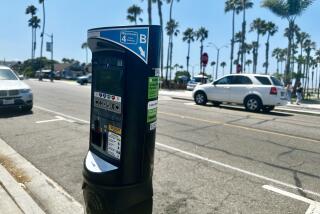Sprint Faces Challenge to Keep Up With Cheats
The crook operating out of a phone booth along a Monterey Park street eschewed such normal contraband as drugs, weapons and Cartier watches.
He was selling telephone numbers. Twenty bucks per connection.
An undercover police officer bought a number and arrested him. A search of the manâs pockets turned up a little black book scribbled with digits. Thirty-nine numbers proved to be access codes for making long-distance calls.
U.S. Sprint, the owner of the numbers, said all of the access codes belonged to legitimate private and business clients. Further, Sprint said, $1.4 million in unauthorized calls were run up on the numbers before they were disconnected.
Seller Convicted
The man dealing in hot numbers on that November day was later convicted of the federal crime of âpossession of 15 or more unauthorized access devices.â But a $500-million problem remains for Sprint and other long-distance services.
âAnytime you have a new technology, someone is going to figure out a way to take advantage of it,â said Syd Courson, director of media relations for U.S. Sprint in Kansas City.
Noting that the annual industrywide loss to fraud is just 1% of the $50 billion in annual revenues, Courson said: âIt is not a crippling problem, but it is a problem and we take it very seriously. That is why we have our own security force,â which investigates suspected frauds and feeds the information to federal or local prosecutors.
To make a long-distance call using Sprint or a similar service, a caller may have to punch up to 27 digits before the call goes through, Courson said. A first seven-digit number gains access to the Sprint network. There is nothing secret about that code, he said.
A second series of seven to nine digits, however, is the authorization code assigned to each customer. Those are the numbers misappropriated and illegally sold, he said.
Some of the thieves hang around banks of pay phones in such places as airports and copy down numbers as people dial them. Others are more sophisticated. They use personal computers to steal numbers directly from company files.
But those are the small fries in the long-distance fraud business, Courson said.
A much bigger illegal bite is taken by slick entrepreneurs who pose as legitimate long-distance companies, he said. As an example, the scam artists âopen up the XYZ phone company and offer a flat rate of $150 a month for unlimited distance calling,â Courson said.
Pay First Bill
Selling over and over the same few codes bought from legitimate companies, the fraud operators pull in payments from their duped customers and may even pay the first monthâs bills.
âBut then they leave and donât bother to pay the next monthâs bills and the numbers are disconnected. The customer is defrauded and the phone company is defrauded,â Courson said.
The losses have been mounting since the market for long-distance services blossomed in the wake of the breakup of AT&T;, Courson said, but technology is coming to the rescue.
The computers that handle Sprintâs calls are being equipped with software that will detect within a few hours when the usage pattern on any of millions of numbers suddenly jumps.
That will set off a warning, and the computer will alert personnel who will call the customer to determine if the surge of calls is legitimate, Courson said. If not, the number will be canceled and the customer given a new number.
Part of the court-ordered breakup of Ma Bell also required local telephone companies to modify their equipment so that long-distance companies other than AT&T; could have âequal accessâ to the system, meaning direct dialing without the network-access code.
When that process is complete, Courson said, Sprint will be able to give customers a four-digit âpersonal-identification number,â like those used for automated teller machines. The personal code will be punched in after the authorization code and will make fraud more difficult, he said.
âSomebody is always going to figure out a way to beat the system, but (fraud) will come down to a manageable level,â Courson predicted, âbecause we will know it a lot sooner and we can pull the plug.â
More to Read
Inside the business of entertainment
The Wide Shot brings you news, analysis and insights on everything from streaming wars to production â and what it all means for the future.
You may occasionally receive promotional content from the Los Angeles Times.









